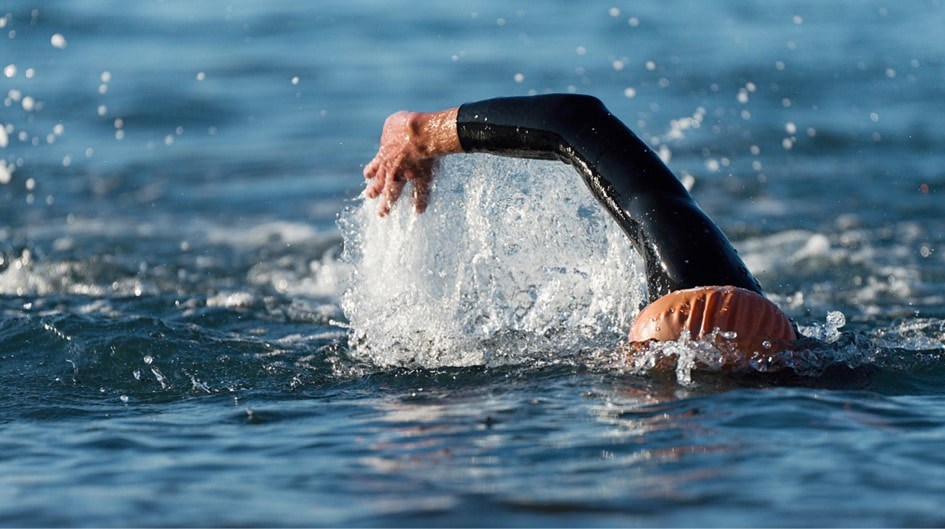|
Tips for Overcoming Open Water Swim Fears
For many triathletes and open water swimmers, a lake, the sea or even rivers can trigger a sense of panic and anxiety. This can result in swimming off course and swimming longer distances than necessary. It can result in irregular breathing making your swim far more difficult. It is important to work on removing these mental blocks and anxiety to ensure that you are swimming efficiently in open water. Most Common Open Water Fears Poor water clarity: Murky lakes or cloudy seas that obscure the depths make many swimmers feel uneasy as they have no idea what they are swimming over and whether there are obstacles in their way. Deep, clear water: In contrast to pool swimming or your lessons, visibly seeing the bottom of the ocean far beneath you can make some feel frightened and uncomfortable. This feeling has often been compared to vertigo. Sea life: It is very common for even adult swimmers to be nervous of the idea they are not swimming alone and sharing the water with sea life. Cold Water: Open water swimming is usually a lot colder that a swimming pool and lessons. Disorientation: Finding your swim bearings in open water can take some getting used to. There is no bottom of the pool to concentrate on to follow a straight line. Equally, as in your lessons, there aren’t any floating lane ropes or visual cues to support you. The water can also be very unpredictable with currents, chops, and swell. Ways to Overcome your Fears of Open Water Swimming Introducing yourself slowly to open water can typically help swimmers and triathletes overcome their fears. Identify which elements make you anxious and gradually expose yourself to those elements. By gradually doing this, your negative response will reduce and will empower you to stay relaxed and calm. We can help you with this during your Strictly Swimming London lessons. Find the best swim gear for you: Wearing the right swim gear while open water swimming is vital. A proper-fitting wetsuit of suitable thickness is necessary in cold water, and it will keep your body temperature at safe levels, add buoyancy, reduce drag and protect you against sharp objects and other swimmers. Snug, tight-fitting goggles are also a must. At Strictly Swimming London, we can practice using your wetsuit during your swimming lessons. Please talk to your coach about this. Familiarise yourself with the area: Identify good entry and exit points in the open water. Check out the water clarity and the feel of the water temperature. Research the area online and check out any forums that can offer advice on specific lakes, beaches, or rivers. Always ask a lifeguard who may be on duty for the area for guidance on the safest parts of the area and things to look out for. Adapt technique: Unlike pool swimming or even during your lessons, swimming in the sea or lakes often requires triathletes and open water swimmers to adapt their stroke techniques to counteract the choppy water and currents. The three main adaptions are increasing to a faster turnover of the arms and stroke rate, a shorter stroke underwater and a punchier style. Swim with a friend: When heading into open water to train, take at least one other person (particularly a friend who is experienced in triathlon)— this can be either a fellow swimmer or just someone who can act as a spotter. Alternatively, why not join a swim or triathlon club. Club members can offer swim support and guidance (which is much more fun). Become mentally strong: Commit to regular open water swimming training sessions and lessons. Start off gradually and slowly. Be aware of your expectations and you will overcome the anxiety associated with open water swimming Prepare your mind for your triathlon as you may be perfecting your stroke during your lessons with us at Strictly Swimming London, but all this work in the pool can be lost if you do not practice this mindful training of what is required in open water. Most triathletes have experienced fear and anxiety in the sea and lakes. At Strictly Swimming London, we can help take you through the steps to overcome this fear. Have faith that with practice, this will be a thing of the past! In conclusion, overcoming a fear of open water and sea swimming is not easy, but it is possible. By following these steps, you can build your confidence and start enjoying the ocean in no time. Remember to take things slowly and be patient with yourself as you work through your fear. With time and practice, you'll be swimming in the ocean with ease and confidence. Please contact Strictly Swimming London for adult lessons. Comments are closed.
|
AUTHORPaul started competing in swimming from the age of 8 and eventually went on to represent his country all over the world. During his time at University, Paul specialised in Aquatics and the Biomechanics of Swimming and produced numerous theses on swimming performance. TOPICS
All
ARCHIVES
June 2024
|
Let's connect!
Copyright © 2024 Strictly Swimming


